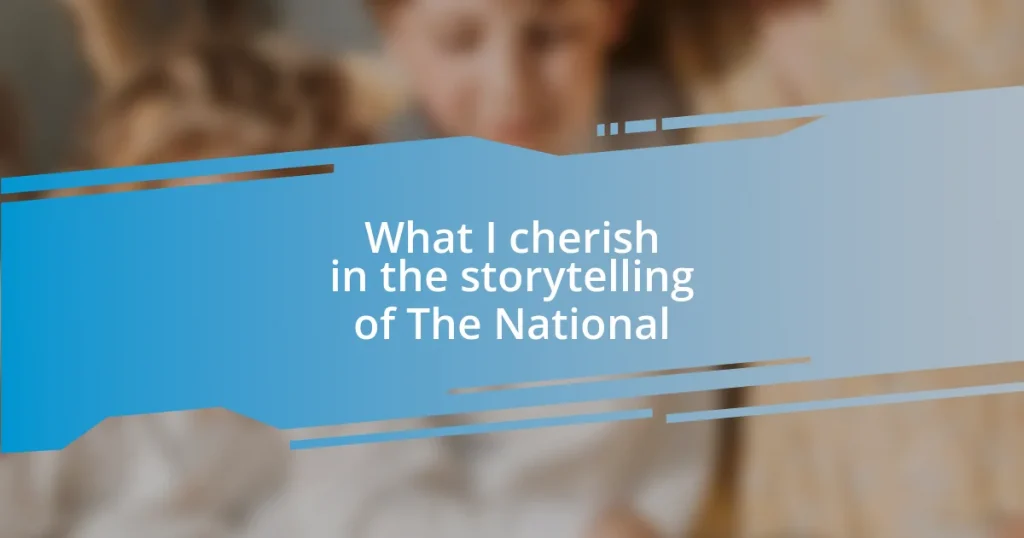Key takeaways:
- The National’s music masterfully conveys deep emotions, exploring themes of love, loss, and existential contemplation while inviting listeners to reflect on their own experiences.
- Their storytelling employs rich imagery and metaphors that create intimate connections, allowing listeners to embrace complex emotions and shared vulnerabilities.
- The impact of live performances enhances the emotional weight of their narratives, fostering a sense of community among fans and deepening the collective enjoyment of their music.
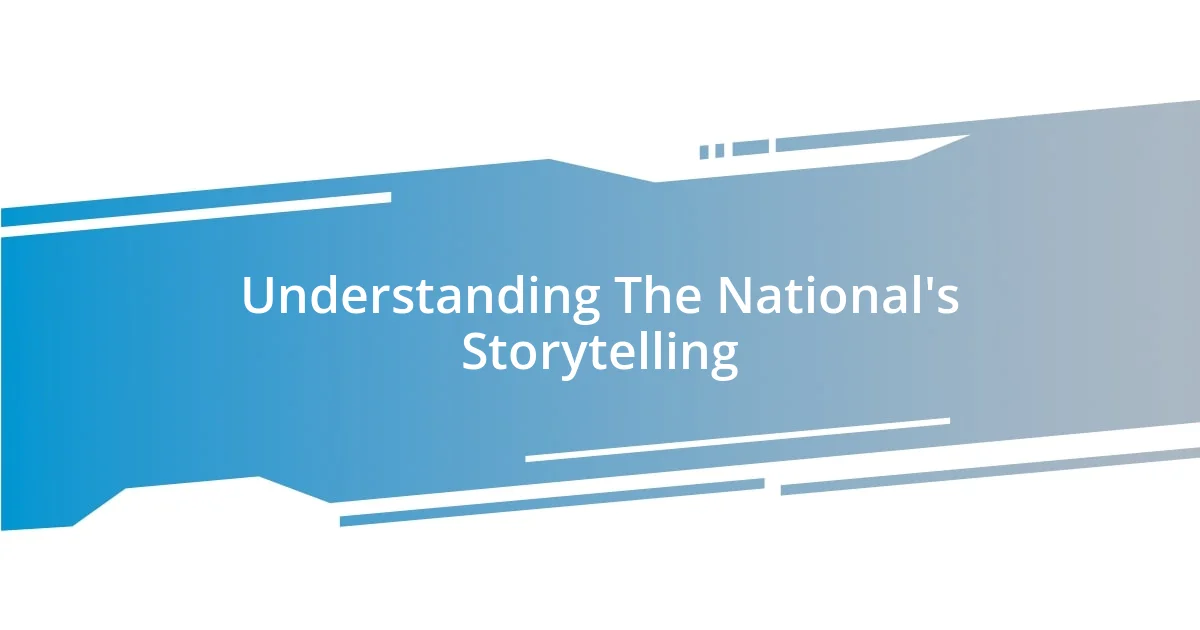
Understanding The National’s Storytelling
The National’s storytelling is a masterclass in conveying deep emotions through vivid imagery. I still remember the first time I listened to “I Need My Girl”; it felt like peeking into an intimate moment of vulnerability. Isn’t it fascinating how a few well-chosen words can evoke such strong feelings of longing and nostalgia?
Their lyrics often explore themes of love, loss, and existential contemplation, creating a tapestry of experiences that many can relate to. For instance, “Slow Show” captures the bittersweet nature of yearning perfectly. It raises the question—haven’t we all experienced that delicate blend of hope and uncertainty in our own relationships?
What truly sets The National apart is their ability to blend personal narratives with universal truths. I often find myself reflecting on the line between solitude and connection that they weave through their songs. Wouldn’t you agree that their music feels like a shared journey, inviting us to confront our own stories as we listen?
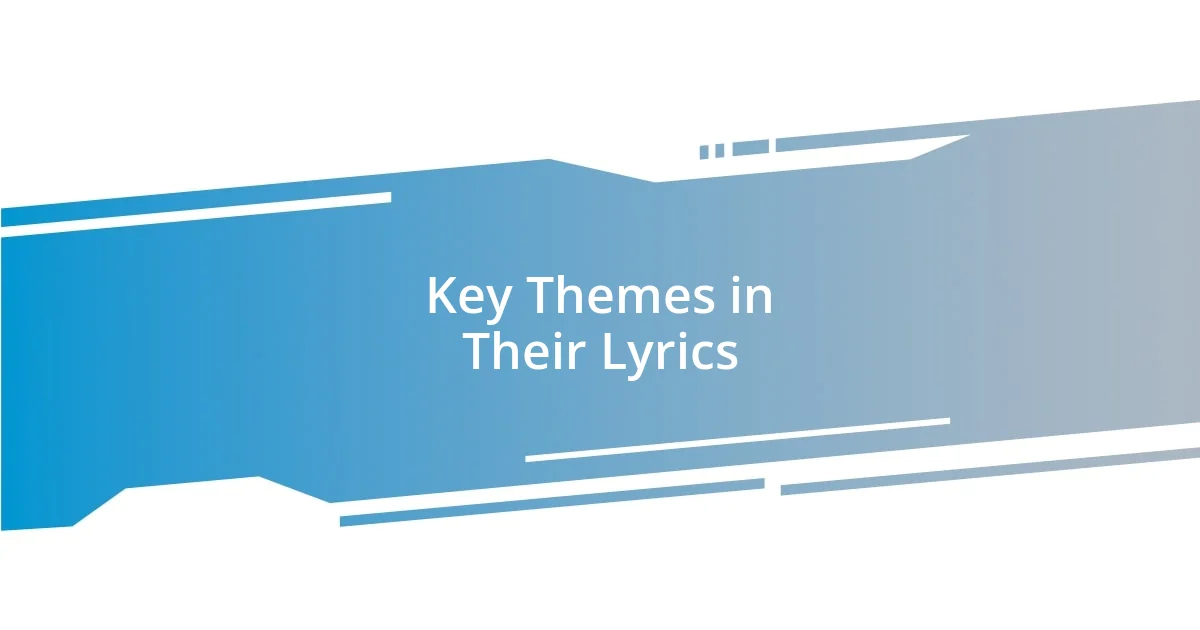
Key Themes in Their Lyrics
The National’s lyrics frequently draw upon the complexities of modern relationships. I remember a late-night drive, the melancholic echoes of “I Need My Girl” mingling with the rolling hills outside. The way they articulate the tension between love and distance resonates deeply, doesn’t it? It’s as if they encapsulate moments we’ve all encountered—those times when being close feels worlds away.
Existential themes run like a current through their work, prompting reflection on life’s fleeting nature. I find myself pondering the evocative imagery in “About Today,” where the lyrics capture the urgency of seizing the present. Have you ever felt that push and pull of wanting to hold onto a moment while grappling with its inevitable passage? It seems they have an uncanny ability to express our internal struggles with such raw authenticity.
Lastly, their use of nostalgia adds a rich layer to their storytelling. In songs like “Bloodbuzz Ohio,” I feel transported back to formative experiences, each lyric a haunting reminder of past choices. Don’t you think there’s something universally comforting about revisiting those memories, no matter how bittersweet? The interplay of memory and desire in their lyrics creates a powerful connection that lingers long after the last note fades.
| Theme | Description |
|---|---|
| Love and Distance | Explores the tension between closeness and emotional separation, revealing vulnerability in relationships. |
| Existential Reflection | Contemplates the fleeting nature of life, urging listeners to embrace the present. |
| Nostalgia | Draws from personal memories, evoking bittersweet emotions linked to past choices. |
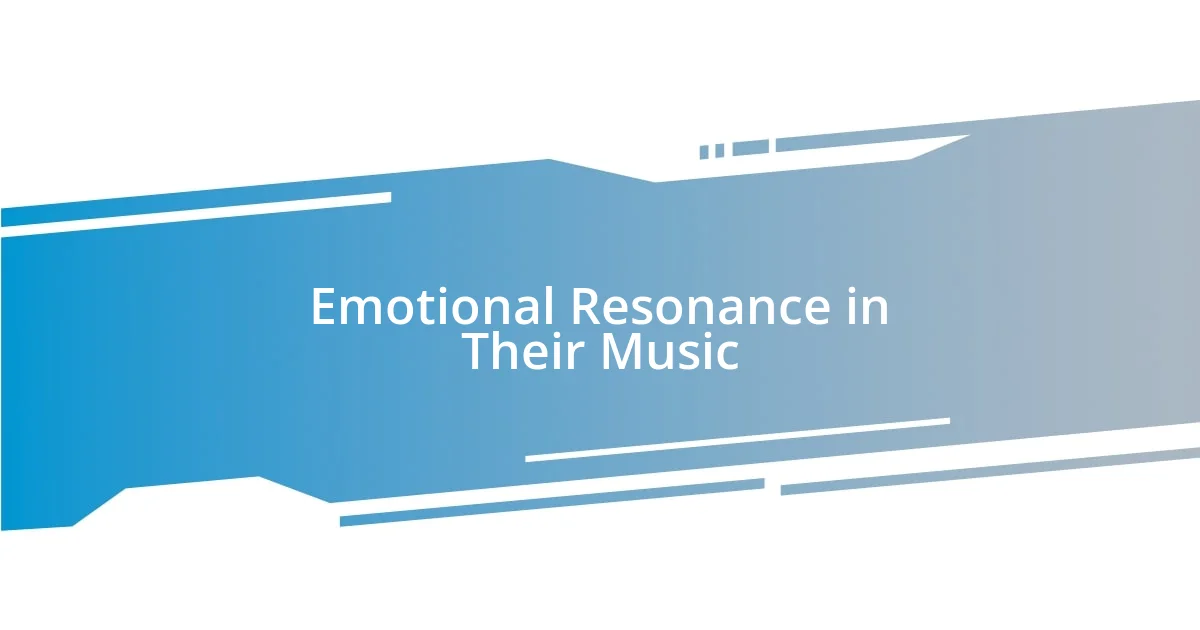
Emotional Resonance in Their Music
The emotional resonance in The National’s music is palpable, touching a nerve in the fabric of our shared human experiences. I recall listening to “Mistaken for Strangers” during a particularly lonely period in my life; the lyrics seemed to echo my own feelings of isolation while simultaneously offering solace. It’s incredible how they manage to articulate those hard-to-pin-down emotions, almost holding up a mirror to our vulnerabilities.
- Their evocative storytelling often delves into themes of despair and hope, creating a poignant balance that many find relatable.
- The haunting melodies and Matt Berninger’s deep, gravelly voice amplify the sense of longing embedded in the lyrics.
- Each song feels like a conversation, where the listener is invited to confront their own memories and feelings alongside the music.
In moments when I feel overwhelmed, songs like “Terrible Love” remind me that I’m not alone in my struggles. The way they intertwine despair with a flicker of light speaks volumes. It’s not just about the lyrical content; it’s the way the music envelops you, making you feel safe enough to explore the more profound aspects of love and loss. This blend of melancholy and beauty is what truly captivates me, making each listening experience a journey into my own emotions.
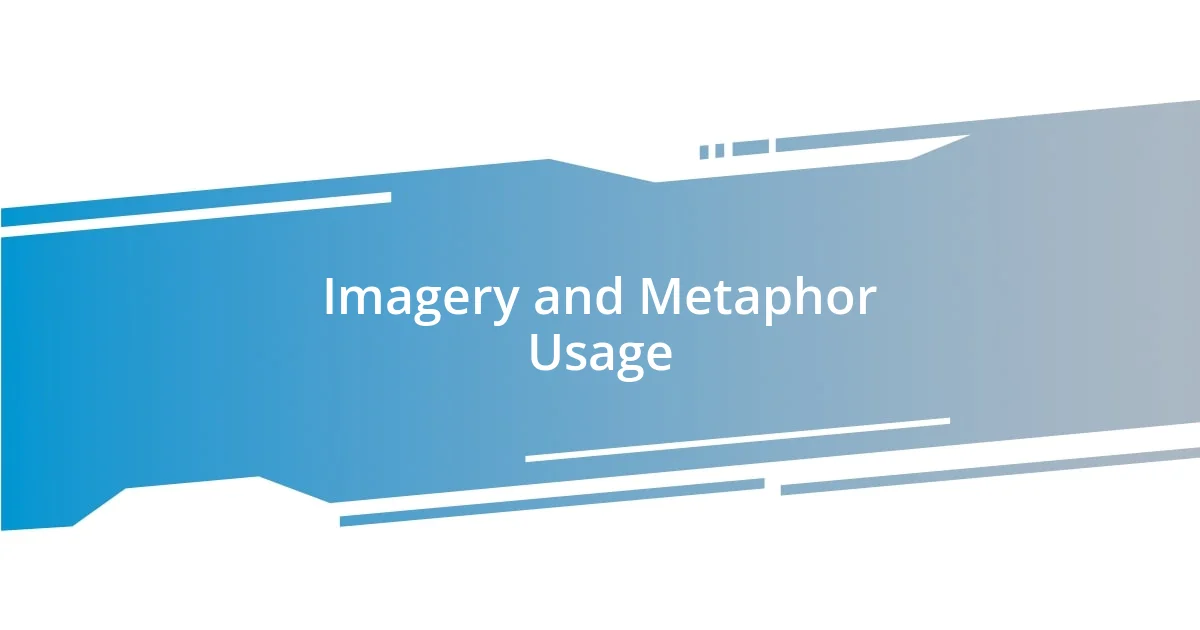
Imagery and Metaphor Usage
The National’s use of imagery is nothing short of masterful. I remember the first time I heard “Slow Show,” and the line about “the smell of the warm bread” instantly transported me to my grandmother’s kitchen. Doesn’t it strike you how a single phrase can evoke such vivid memories? Their ability to weave sensory details into their lyrics creates a tapestry that immerses listeners in a world that feels both personal and universal.
Metaphors in their storytelling breathe life into complex emotions. Take “Sorrow” for instance; it’s not just a song but a narrative that encapsulates the weight of melancholy as if it’s a tangible object you can hold. When I think about how they portray sorrow, it makes me wonder—how often do we let ourselves fully experience our feelings instead of brushing them aside? Their metaphors invite us to embrace our emotions, allowing them to coexist instead of fighting to suppress them.
Through their evocative imagery and rich metaphors, The National fosters an intimate connection with their audience. I found myself reflecting on the phrase “you know what I mean,” a subtle yet powerful assertion that acknowledges our shared experiences. Is there anything more comforting than realizing that someone else has articulated your feelings? In a world that can feel isolating, I cherish how their lyrics capture our collective struggles, turning them into moments of clarity and solace.

The Role of Personal Experience
Personal experience plays a pivotal role in how I connect with The National’s storytelling. When I listen to “I Need My Girl,” I can’t help but recall a time when I was far away from someone I loved—it felt as if Matt Berninger was pulling all those feelings of longing and vulnerability right from my heart and sharing them with the world. Doesn’t it make you think about how our own experiences can amplify the meaning behind a song? I often find myself lost in memories when their lyrics resonate with my own life, transforming my emotional landscape.
There’s something profoundly intimate about how The National draws from personal experience in their songwriting. In “Slow Show,” the recollection of fleeting moments in a relationship makes me think about my past. I remember a quiet evening, just sitting around a fire, realizing how easily those tiny instants slip away yet leave a lasting imprint. It’s as though the band invites us to reflect on our own moments. Have you ever felt time pause as you shared something genuine with someone? This is exactly the type of introspection their music evokes for me.
This deep connection to personal experience is what makes The National’s music so compelling. I often find myself wondering how many listeners feel that same sense of intimacy when hearing a song. Personally, their melodies and lyrics become a soundtrack to my own life narrative, shaping how I perceive my experiences. The way they illustrate complex feelings reminds me that I’m not just a passive listener; I’m a participant in a shared emotional journey. Isn’t it enriching to think that others are experiencing their own reflections as they engage with the music?
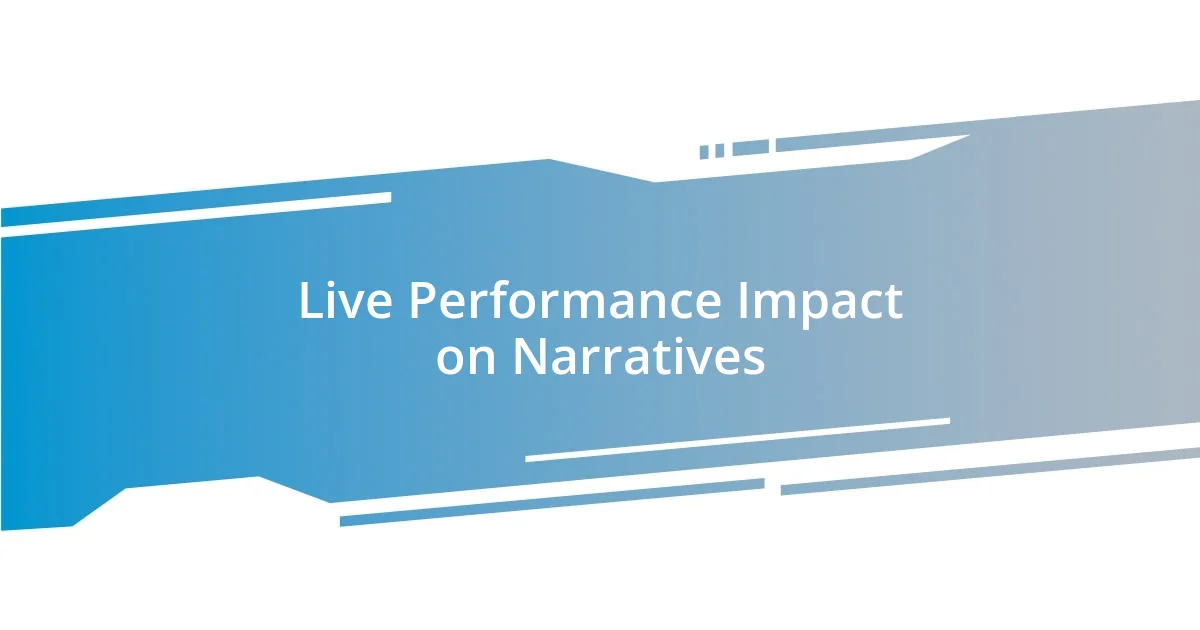
Live Performance Impact on Narratives
The impact of live performances on The National’s narratives is truly captivating. I remember attending one of their concerts where the energy in the crowd felt electric, almost as if we were all part of a shared dream. When they played “Graceless,” the way Matt Berninger’s voice soared filled the venue with an intensity that transformed the song’s themes of vulnerability and resilience. It made me realize how a live setting enhances the emotional weight of their stories, creating a communal experience that you just can’t replicate in the studio.
There’s a certain magic in hearing their lyrics resonate in real time, with every chord and drumbeat amplifying the narrative’s depth. During “Fake Empire,” it struck me how the collective swaying of the audience mirrored the uncertain yearning within the song’s lyrics. In those moments, I found myself asking: How does this live energy shape our understanding of each song? For me, grappling with the emotions live often leads to an unexpected catharsis, grounding the lofty themes in tangible feelings shared among strangers.
When I reflect on the intimacy of a live show, I can’t help but think of how it allows us to confront our own emotions together. One night, as I stood there surrounded by fellow fans, the rawness of “Afraid of Everyone” washed over me, allowing us to share a collective sigh of worry. That connection to both the band and the crowd makes the narratives feel more personal, like communal confessions that bridge our individual experiences. Have you ever felt that sense of unity among strangers? It’s precisely in these live moments that The National’s narratives become both a soundtrack and a mirror to our collective lives.
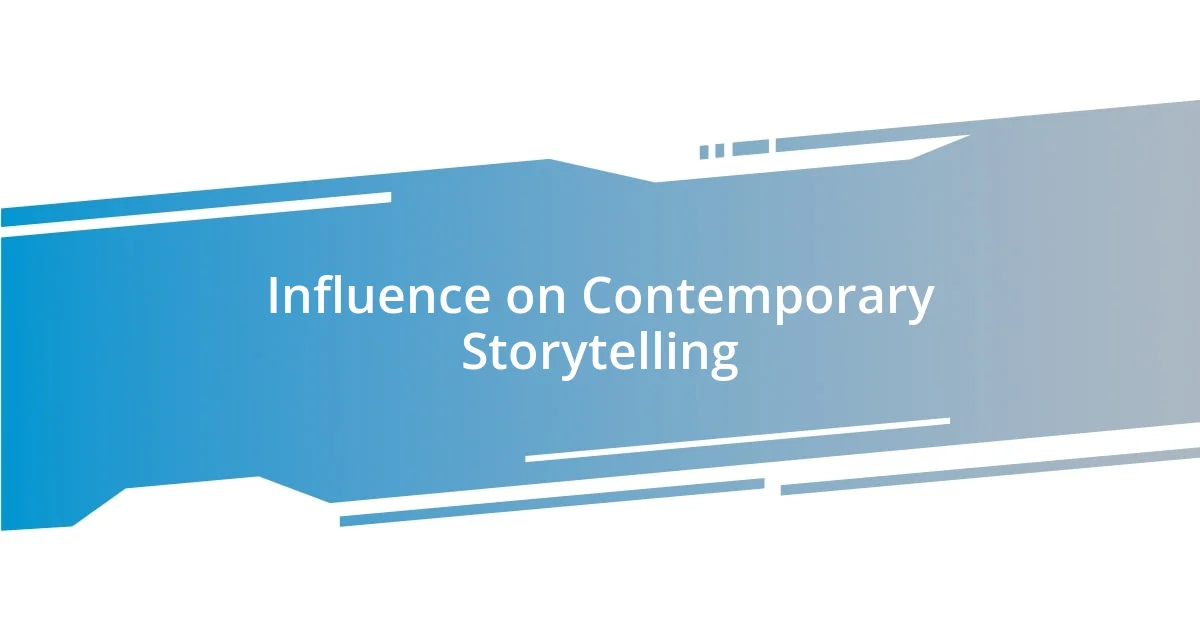
Influence on Contemporary Storytelling
The influence of The National on contemporary storytelling is palpable, and I often find myself appreciating how their lyrics encapsulate complex feelings that many artists shy away from. For instance, during a recent listening session of “The System Only Dreams in Total Darkness,” I marveled at how the narrative captures the confusion of relationships and the feeling of being lost. Have you ever found yourself grappling with such emotional complexities? This song illustrates not just a story but an emotional experience that resonates deeply within us.
Their storytelling pushes boundaries by blending poetic imagery with raw emotion, inspiring many modern songwriters to explore their vulnerabilities. I recall hearing a fellow musician perform a song inspired by The National, weaving intricate tales of nostalgia and longing into their verses. It made me wonder: How does one band’s approach to storytelling set off a ripple effect in today’s music scene? They encourage listeners and creators alike to embrace their stories, igniting a wave of authenticity that echoes in the work of emerging artists.
In many ways, the band’s narrative style has changed how I perceive storytelling in music, prompting me to pay closer attention to the themes woven into each song. I’ve caught myself analyzing lyrics as if I were dissecting a novel, looking for hidden layers and connections to my own life. This approach enriches my listening experience and fosters a deeper appreciation for the subtleties of storytelling. Isn’t it fascinating how a single band can transform our understanding of personal narratives within music?











